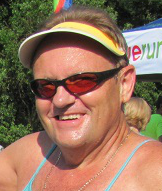yourself for the big race. Make sure you are all sleeping enough and maintain your immunity. Visualize the race at every opportunity you have.
Identify one or two short races and run them at 30 seconds faster than your anticipated Comrades pace. If
you haven’t done any speed training, take it easy so that you do not injure yourself. You can still do hill repeats on a Monday with the club and two Klapperkop runs on a Sunday just to get the final heat exposure you need. We have the Wally race on Thursday – please come and support/run this well-organised event. The Jackie Mekler 25 km run should be an easy run though.
Please support the training sessions organised by the club.
Happy running.
Coach Rossouw


 RSS Feed
RSS Feed